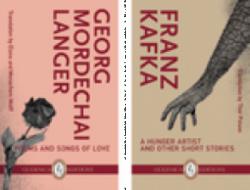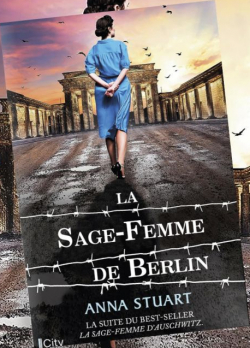Leslie Kaplan - L'Assassin du dimanche - éditions P.O.L - où Leslie Kaplan tente de dire de quoi et comment est composé "L'Assassin du dimanche" et où il est question notamment de femmes qui s'organisent et de collectif, de littérature et de hasard, de Franz Kafka et de Samuel Beckett, d'une usine de biscottes et du jardin du Luxembourg, à l'occasion de la parution aux éditions P.O.L de "L'Assassin du dimanche", à Paris le 21 mars 2024
"Une série de féminicides, un tueur, « l'assassin du dimanche ». Des femmes s'organisent, créent un collectif, avec Aurélie, une jeune qui travaille en usine, Jacqueline, une ancienne braqueuse, Anaïs, professeure de philosophie, Stella, mannequin, Louise, une femme de théâtre…"

Franz KafkaGeorg Mordechai Langer/5
1 notes
Résumé :
Franz Kafka's writings are characterized by an extreme sensitivity manifested in absurdity, alienation, and gallows humor. These two particular collections of short pieces, A Country Doctor (1919) and A Hunger Artist (1924), newly translated by Thor Polson, represent later works in the corpus. Poems and Songs of Love is a translation of the collection Piyyutim ve-Shirei Yedidot by Georg Mordechai Langer. Published in Prague in 1929, it contains an elegy to Langer's ... >Voir plus
étiquettes
Ajouter des étiquettes
Que lire après A Hunger Artist & Other Stories; Poems and Songs of LoveVoir plus
Critiques, Analyses et Avis (1)
Ajouter une critique
The first thing to know is that it's a flipside book. On one hand you have “A Hunger Artist and Other Short Stories” by Franz Kafka, and on the other it's “Poems and Songs of Love” by Georg Mordechai Langer, translated from Hebrew by Elena and Menachem Wolff. I read a digital version, which made me regret the good old paper books, which I could have simply turned in my hands instead of reprogramming the settings my computer screen for the second half.
These two works were put together mostly because of the link between the original writers. Kafka was a friend and a mentor for Langer, although we also learn in Langer's poetry that he was in love with Kafka. But let's start with the beginning. There're pretty strange short stories in this book. Surreal, disturbing, sad… You never really know what's coming. You don't really know if things make sense, but it doesn't matter. You enter in a kind of alternate universe where the writer wants you to think differently, to think his way. At first, it's baffling (especially “A Country Doctor”, and its dreamlike setting), but soon enough you get used to it and you're really looking forward to the next story.
Some of them left me thinking (“In Front of the Law”), others left me more indifferent, but I most admit that everyone of them has at least a little something. The style is constantly reinvented so it seemed to me each story could have been written by someone different, but at the same time you can feel that they're all interconnected. I think that one of my favourites is “An Ancient Manuscript”, which is about the fear of immigrants and difference. I read this side of the book twice, so the second time I could enjoy even more the texts, that I already knew by then.
About “Poems and Songs of Love”, I have to say that I have no idea how faithful to the original the translators have been since I can't read Hebrew, but the English version by itself is definitely a success. I don't consider being qualified enough to analyse their meaning, but I think the words are perfectly chosen and the images powerful.
Lien : https://enattendantdemain.wo..
These two works were put together mostly because of the link between the original writers. Kafka was a friend and a mentor for Langer, although we also learn in Langer's poetry that he was in love with Kafka. But let's start with the beginning. There're pretty strange short stories in this book. Surreal, disturbing, sad… You never really know what's coming. You don't really know if things make sense, but it doesn't matter. You enter in a kind of alternate universe where the writer wants you to think differently, to think his way. At first, it's baffling (especially “A Country Doctor”, and its dreamlike setting), but soon enough you get used to it and you're really looking forward to the next story.
Some of them left me thinking (“In Front of the Law”), others left me more indifferent, but I most admit that everyone of them has at least a little something. The style is constantly reinvented so it seemed to me each story could have been written by someone different, but at the same time you can feel that they're all interconnected. I think that one of my favourites is “An Ancient Manuscript”, which is about the fear of immigrants and difference. I read this side of the book twice, so the second time I could enjoy even more the texts, that I already knew by then.
About “Poems and Songs of Love”, I have to say that I have no idea how faithful to the original the translators have been since I can't read Hebrew, but the English version by itself is definitely a success. I don't consider being qualified enough to analyse their meaning, but I think the words are perfectly chosen and the images powerful.
Lien : https://enattendantdemain.wo..
Citations et extraits (3)
Ajouter une citation
"Will you be able to save me?" the boy whispers, swallowing hard and completely transfixed by what's living in his wound. That's how people are in my district: they always demand the impossible from their doctor. They've lost their old religious faith; the local priest sits at home and slowly tears his vestments to pieces, one after the other; but the doctor is supposed to get everything done with his gentle, surgical hand.
Indeed the turn has come, the bond is at an end,
a bond made of waves of the sea of the world;
a bond made of waves of the sea of the world;
You never know what sorts of things you have handy in your own house.
Lire un extrait
Videos de Franz Kafka (64)
Voir plusAjouter une vidéo
Les plus populaires : Littérature étrangère
Voir plus
Les Dernières Actualités
Voir plus
Autres livres de Franz Kafka (104)
Voir plus
Quiz
Voir plus
La métamorphose, de Kafka
Comme d'habitude, quel est le prénom du personnage principal ?
Georges
Grégoire
Gregor
Grigory
7 questions
214 lecteurs ont répondu
Thème : La métamorphose de
Franz KafkaCréer un quiz sur ce livre214 lecteurs ont répondu







































